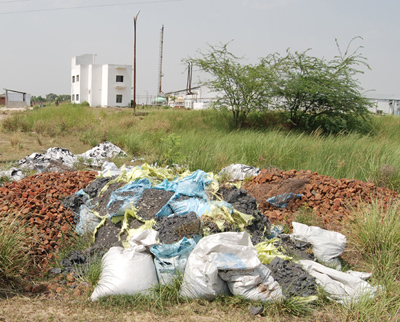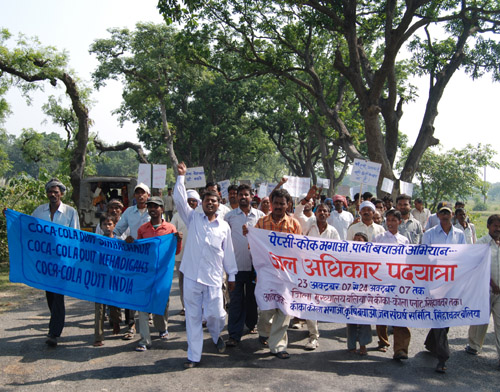|
Home--News
Coca-Cola Plant Shut Down in India
Community Welcomes Decision, Company Cites "Unbearable" Financial
Losses
For Immediate Release
August 14, 2008
Contacts:
Chinta Dewi, Coca-Cola Bhagao, Krishi Bachao Sangharsh Samiti +91
94507 79325 (Hindi)
Nandlal Master, Lok Samiti +91 94153 00520 (Hindi)
Amit Srivastava, India Resource Center +91 98103 46161 (India) +1
415 336 7584 (US)
New Delhi (August 14, 2008): The India Resource Center can confirm
that the Coca-Cola company has shut down another bottling plant in
India - in Sinhachawar in Ballia district in Uttar Pradesh.
A community-led campaign had demanded the closure of the Coca-Cola
bottling plant in Sinhachawar because of indiscriminate pollution
by the bottling plant as well as illegal occupation of land.

Illegally Dumped Sludge at Sinhachawar Coca-Cola Plant
|
|
The India Resource Center had led a fact finding team to the plant
in June 2007 and found shocking incidences of pollution that were
in complete violation of environmental laws and regulations in India.
While the community knew that the plant had been un-operational since
the fact finding visit, this is the first official confirmation of
the closure.
The bottling plant in Sinhachawar was a Coca-Cola franchisee owned
unit operated by the Brindavan Bottlers Limited, which is owned by
India's largest bottler of Coca-Cola, the Ladhani Group of Companies.
In a letter to the Uttar Pradesh Pollution Control Board dated October
27, 2007, Brindavan Bottlers informed the Board about the closure
of the plant due to "huge" and "unbearable" financial losses.
The letter was dated three days after a major protest at the plant.
"We welcome the official closure of the bottling plant which we had
demanded. We will now hold Coca-Cola accountable for the damages they
have caused in the area because of their negligence," said Mrs. Chinta
Dewi, sarpanch (head of the village council) and member of the locally
based Coca-Cola Bhagao, Krishi Bachao Sangharsh Samiti (Get Rid of
Coke, Save Farming Struggle Committee).
Another Coca-Cola bottling plant - in Plachimada in Kerala - has been
shut down since March 2004 due to community opposition.
"Community campaigns in India have shut down Coca-Cola bottling plants
in Plachimada and in Balia, and now we will ensure that Coca-Cola
bottling plants in Mehdiganj and Kala Dera also meet the same fate,"
said Nandlal Master of Lok Samiti, a community group challenging Coca-Cola's
operations in Mehdiganj, near Varanasi. Lok Samiti worked very closely
with the community in Sinhachawar towards the plant's closure.

March Towards Coca-Cola Plant in Sinhachawar, October 24, 2007
|
|
The Coca-Cola company is also the target of intense community campaigns
in Mehdiganj and Kala Dera in India for creating water shortages and
pollution. The company was forced to agree to an assessment of its
bottling operations in India as a result of a sustained international
campaign. The assessment, released in January 2008, was a damning
indictment of Coca-Cola's water management practices in India. The
assessment recommends that Coca-Cola shut down its bottling plant
in Kala Dera because the plant contributes significantly to water
shortages in the area.
"The Coca-Cola company has chosen to embark on an ambitious public
relations drive to paint a green image of itself globally. But Coca-Cola's
track record on the ground in India is one of dismal environmental
and human rights problems, and no amount of public relations can solve
the problems it continues to create in India," said Amit Srivastava
of the India Resource Center, an international campaigning organization
that works directly with communities in India to challenge Coca-Cola.
The fact finding team in June 2007 found several cases of pollution,
including:
- The bottling plant has indiscriminately dumping its sludge,
considered to be industrial hazardous waste, across the plant
premises, in complete violation of the laws regarding handling
and disposal of industrial hazardous waste in India.
- The Effluent Treatment Plant was non-operational, and the bottling
plant was discharging its wastewater into surrounding agricultural
fields and a canal that feeds into the river Ganges.
- The plant did not disclose the amount of hazardous waste being
used and generated, as required by the Supreme Court of India
for all industrial units in India that deal with hazardous waste.
The full report with images can be found at http://www.indiaresource.org/campaigns/coke/2007/cokebaliafact.html,
in Hindi at http://www.indiaresource.org/campaigns/coke/2007/baliahindireport.pdf
For more information, visit www.IndiaResource.org
---ends---
FAIR USE NOTICE. This document contains copyrighted material whose use has not been specifically authorized by the copyright owner. India Resource Center is making this article available in our efforts to advance the understanding of corporate accountability, human rights, labor rights, social and environmental justice issues. We believe that this constitutes a 'fair use' of the copyrighted material as provided for in section 107 of the U.S. Copyright Law. If you wish to use this copyrighted material for purposes of your own that go beyond 'fair use,' you must obtain permission from the copyright owner.
|

![]()

